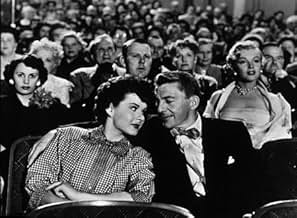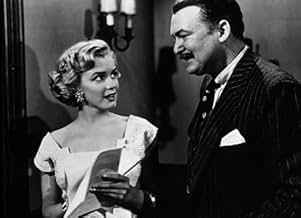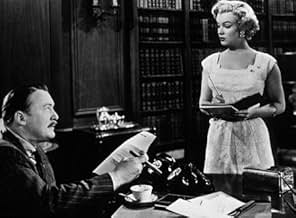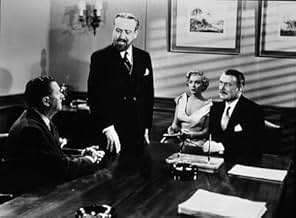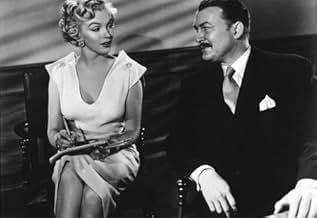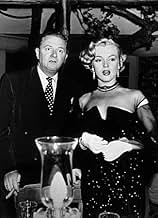अपनी भाषा में प्लॉट जोड़ेंA 65-year-old printer hatches an elaborate scheme to avoid forced retirement.A 65-year-old printer hatches an elaborate scheme to avoid forced retirement.A 65-year-old printer hatches an elaborate scheme to avoid forced retirement.
- Willie McKinley
- (as Rusty Tamblyn)
- Concert Guest
- (बिना क्रेडिट के)
- Head of Sales
- (बिना क्रेडिट के)
- Luncheon Guest
- (बिना क्रेडिट के)
- Clancy
- (बिना क्रेडिट के)
- Concert Guest
- (बिना क्रेडिट के)
- Concert Guest
- (बिना क्रेडिट के)
फ़ीचर्ड समीक्षाएं
The problem, for Woolley, was age. To an extent, in the early 1940s, he was able to still play grouchy sorts who were not too old (say about 50). But as the 1940s went forward, Woolley's age became a handicap. It was harder and harder to find material for him where he was the star.
Without a doubt his last starring role was as John Hodges, the 65 year old printer who is forced by a company policy to retire while he is still mentally and physically vigorous. Few films from Hollywood had tackled the issue of aging. The best known one was Leo McCarey's MAKE WAY FOR TOMORROW, with Victor Moore and Beulah Bondi, which remains a heartbreakingly sad film. But that was made in 1935. Except for an occasional comment about aging in a film (like Berton Churchill's comment to John Carridine not to heed his white hairs if he is hesitant to challenge Churchill to a fight in STAGECOACH), most of the movies ignored aging. Even before the 1960s and President Kennedy's pushing a cult of youth and vigor, Hollywood was pretty much doing the same thing.
So this is why AS YOUNG AS YOU FEEL is such an unusual film. Besides Woolley getting one of the best parts of his career, it tackled a relatively taboo subject. Why talk about the inevitable that nobody likes to think about - aging and weakening...and eventually death. It's a downer in terms of a theme for a film (as McCarey's movie had brilliantly shown). But in point of fact AS YOUNG AS YOU FEEL is the reverse side of the coin.
Woolley is forced to retire from his firm, and is angry about it. Then, by chance, he is able to temporarily take over the media and town's attention when he is mistaken for the multi-millionaire (Minor Watson) who has taken over the factory that retired Wooley. Being an intelligent man, his opinions get huge publicity and sweep the nation. Woolley stresses that the chronicle age of the individual does not mean that he or she is to be put out to pasture, if he or she is capable of functioning and contributing to society. Soon Woolley finds he is in demand everywhere due to his spunky philosophy. Watson, of course, is amazed at the error, but does not stop it - he finds that it is enhancing his own public image (after all, the media and the public think Woolley is Watson).
At the same time, Woolley finds the masquerade is getting out of hand in many ways. It is playing havoc with his grandson (David Wayne's) career. It is also playing havoc with the family life of the manager of the factory (Albert Dekker and his wife Constance Bennett). So caught up in the American dream of making a success of himself for his family, Dekker has distanced himself from his wife and son. Then Woolley shows up, and Bennett decides she wants to divorce her stodgy husband Decker for that lively old wire Woolley!
It was a nicely written role (by Paddy Chayefsky)and Woolley did very well in it. Ironically, despite the philosophical point of view in the film, the studio system ignored the message. Woolley never had another great lead part after this film. His last memorable part was as an elderly adviser to the young Persian Monarch in the musical KISMET - not a really big part that.
Ironically too, the film was one of a long string of early films that Marilyn Monroe appeared in from 1949 (from LOVE HAPPY) to 1952 (the Cary Grant - Ginger Rogers MONKEY BUSINESS). Monroe did well in most of these roles, and they gave her exposure, but even in the meatiest ones (CLASH BY NIGHT) she did not "star" in them. Yet Marilyn's name means so much to this day in film lore to the public, these early films are usually sold in "Marilyn Monroe" collections. The ever youthful, ever too fragile Marilyn remains a Hollywood icon forty - four years after her death in 1962. Monty Wooley died in 1963, but I doubt that a hundredth of the people who adore the memory of Marilyn ever think seriously about Monty and his best performances.
Woolley plays John Hodges, who at the age of 65, is fired from his job in a printing company due to corporate policy that no one can work past 65. Many baby boomers wish that were the case today, because in fact, they'll be working way past 65. He finds out that the company he works for is a subsidiary of a huge company that is owned by a huge corporation. Finding out the name of the President of that huge corporation, he dies his hair and whiskers and poses as the man, comes to town, tours the plant, and makes a speech in which he declares that the knowledge of our elders is critical in printing, and changes the policy.
And there the fun begins. The boss' wife (Constance Bennett), feeling unloved by her husband (Dekker), falls for Hodges; his granddaughter's boyfriend (Wayne) recognizes him and tells someone else at the plant; and the corporation doesn't know what to do. This fake president has raised their stock and given them a fabulous profile, so much so that the labor union has settled their grievances with them. How can they call his bluff? I seem to have enjoyed this film more than some of the other posters. Thelma Ritter, as John's daughter-in-law, is a scream. An ex-singer who gave up her career to marry George (Joslyn), John's son, sings "Temptation" while in the kitchen - she's hilarious. Woolley is great as an older man not ready to be put out to pasture, and it's wonderful to see one of the great stars of the '30s, Constance Bennett, in a later role.
This film is remembered today as early Marilyn Monroe. She plays the boss' sexy secretary, and she does a wonderful job. It's a small role, but you can definitely see that she, Peters, who plays the granddaughter, and David Wayne are all getting the star buildup and are each at different stages of it. Monroe was just about to break through, and she and Wayne would appear together in "How to Marry a Millionaire" (where he says, "I already think you're quite a strudel.") Entertaining and definitely worth seeing.
Monty Woolley (as John Hodges) carries the film as a printer who is pushed into retirement at age 65 and decides to impersonate the president of the holding company that owns the printing plant where he worked. This sets up a sort of 'Being There' effect, where his views on national affairs become an inspiration to the whole country. David Wayne (who would eventually play the Mad Hatter on "Batman") plays his prospective son-in-law and their scenes are all gems, partly because they have a real chemistry and partly because they got the best dialogue. The best scene is the opening, a very well staged scene of the company orchestra playing the "Nutcracker": the camera opens on a promotional poster, pans left and takes us into the concert hall as a little girl scurries to her seat. The camera moves around in the crowd where we meet most of the main characters. Hodges is playing one of the piccolos and he soon launches into an impromptu solo, much to the annoyance of the guest conductor and an accurate preview of what his role will be throughout the film.
This film is fairly entertaining but is most valuable as a cultural artifact. Because it was not a high budget production the cast is almost entirely older stars at the very end of their careers (like Wooley and Constance Bennett) and young actors at the beginning (Wayne, Jean Peters, and Marilyn Monroe). So there is a kind of torch passing at work. It is also hints at Monroe's special screen presence which somehow allowed her to beat the Hollywood starlet system. She and Peters were the same age (both were born in 1926) and had both started too late in the movie business. By this film they had already lost all the youthful luster of their early 20's (check out how much better Peters looked two years earlier in 'It Happens Every Spring' and Monroe before she became a blonde), yet Monroe was somehow able to transcend this and become a big star.
Arthur Miller said of Monroe: "She was rarely taken seriously as anything but a sex symbol. To have survived, she would have had to be either more cynical or even further from reality than she was. Instead, she was a poet on a street corner trying to recite to a crowd pulling at her clothes."
क्या आपको पता है
- ट्रिवियाDuring the production of this film, Marilyn Monroe met her future husband, Arthur Miller.
- भाव
Frank Erickson: [Trying to convince Gallagher that their visitor was a fake] All you have to do is to look at his picture in the file, sir.
Horace Gallagher: Never mind the file. Now let me get this straight. You say the whole world thinks that the man who inspected our plant yesterday was the president of the Consolidated Motors, is that it?
Frank Erickson: Yes, sir. Then he made a speech at the Chamber of Commerce.
Horace Gallagher: Mr. McKinley thinks he is the president of the Consolidated Motors, the papers think so, the Chamber of Commerce thinks so, but you don't. You think he is a measly little printer in our hand-press department.
Frank Erickson: I am sorry if you refuse to believe me, Mr. Gallagher.
Horace Gallagher: [sarcastically] Aw, don't be silly Erickson. Of course I believe you. And by the way, my name isn't Gallagher. I am Harry Truman, President of the United States. And you are not Erickson. You're Princess Elizabeth's baby, bonny Prince Charley, remember?
- कनेक्शनFeatured in Biography: Marilyn Monroe: The Mortal Goddess (1996)
- साउंडट्रैकYou Make Me Feel So Young
(1946) (uncredited)
Written by Josef Myrow
Lyrics by Mack Gordon
Sung by a chorus during the opening credits and played occasionally in the score
टॉप पसंद
- How long is As Young as You Feel?Alexa द्वारा संचालित
विवरण
- रिलीज़ की तारीख़
- कंट्री ऑफ़ ओरिजिन
- भाषा
- इस रूप में भी जाना जाता है
- Nunca es tarde
- फ़िल्माने की जगहें
- उत्पादन कंपनी
- IMDbPro पर और कंपनी क्रेडिट देखें
- चलने की अवधि1 घंटा 17 मिनट
- रंग
- पक्ष अनुपात
- 1.37 : 1
इस पेज में योगदान दें




